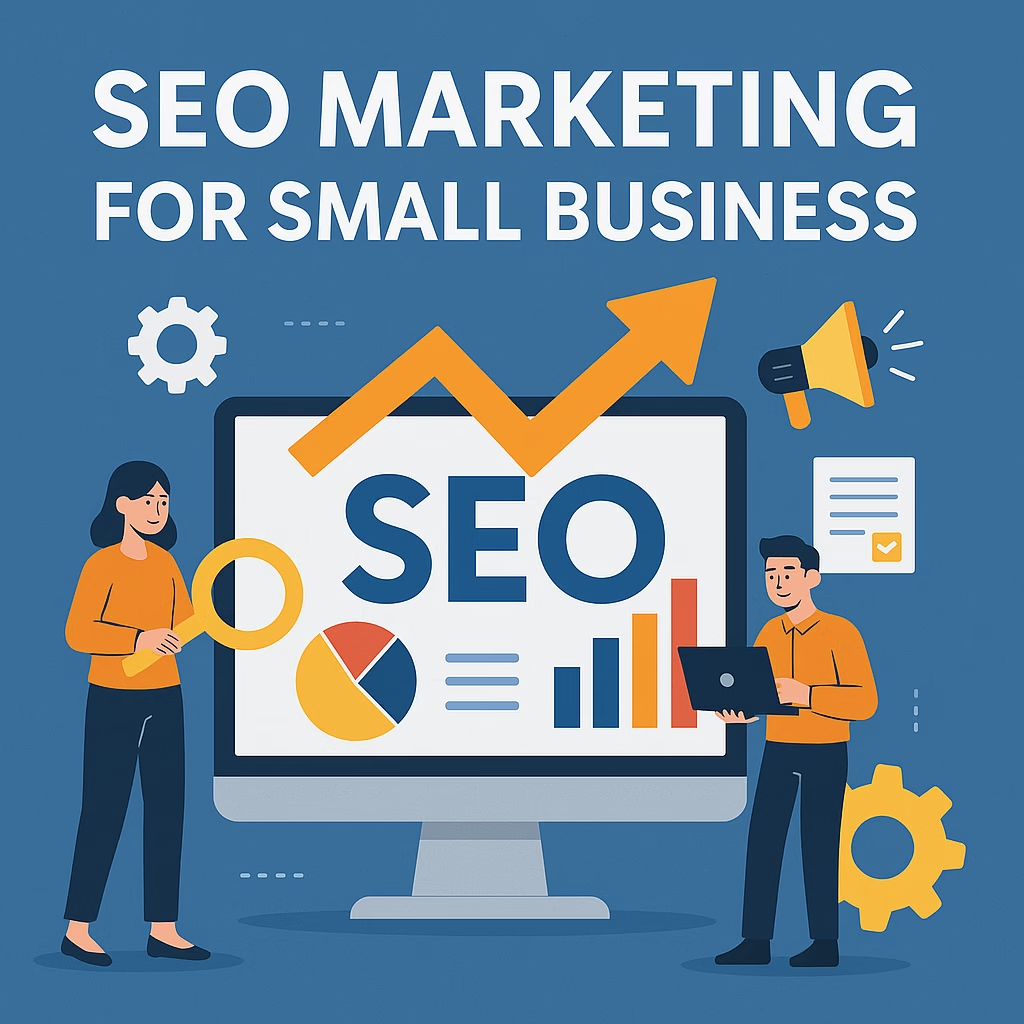The Ultimate Guide to SEO Marketing—
for Small Business
- SEO
- July 28, 2025
- Anas Mami
In today’s competitive digital landscape, small business owners face a common challenge: how to get their website seen by potential customers. While paid advertising and social media have their roles, SEO marketing for small business remains the most sustainable and cost-effective method to boost online visibility and attract organic traffic.
If you’re feeling overwhelmed or frustrated with your current efforts, this guide is designed specifically for you. We break down SEO into manageable steps that deliver real results.
Why SEO Marketing Matters for Small Business
et’s start with the basics. SEO (Search Engine Optimization) is the process of optimizing your website so it ranks higher in search engine results pages (SERPs). When your site appears near the top of Google or Bing results, more people will find and visit your website.
For small businesses, effective SEO marketing can:
Drive consistent, high-quality traffic
Increase brand credibility and trust
Generate leads without paid advertising
Provide long-term ROI compared to PPC
Compete with larger competitors in your niche
Common SEO Challenges Small Businesses Face
Many small business owners struggle with SEO for various reasons:
Lack of time and resources
Uncertainty about where to start
Frustration from low results despite efforts
Technical complexity of SEO tools and platforms
Keeping up with Google’s algorithm updates
The good news? You don’t need to be a tech guru or hire an expensive agency to see improvements. With some basic knowledge and consistent effort, you can master SEO marketing for small business.
Step-by-Step SEO Strategy for Small Businesses
1. Define Your Goals and Audience
Before jumping into technical optimizations, clarify your business objectives:
Do you want more local customers?
Are you aiming to boost online sales?
Do you want to grow your email list or drive appointments?
Next, understand your ideal customers:
What keywords are they typing into search engines?
What problems are they trying to solve?
Where do they spend their time online?
2. Conduct Keyword Research
Keywords are the foundation of SEO. You need to identify search terms your audience uses and optimize your content around them.
Use tools like:
Google Keyword Planner
Ubersuggest
Ahrefs
SEMrush
Look for keywords with:
High relevance to your product/service
Reasonable search volume
Low to medium competition
Examples of keywords for a local bakery might include:
Best cupcakes in [Your City]
Order birthday cakes online
Gluten-free desserts near me
3. Optimize Your Website Structure
A clean, fast, and user-friendly website structure helps both users and search engines navigate your content.
Key tips:
Make sure your site is mobile-friendly
Use fast-loading hosting and compress images
Create a clear navigation structure
Use SEO-friendly URLs (e.g., yoursite.com/seo-marketing-small-business)
4. On-Page SEO Best Practices
This is where your content and HTML structure are optimized to help search engines understand your pages.
Important elements:
Title Tags: Use your keyword (e.g., “SEO Marketing for Small Business”) near the beginning.
Meta Descriptions: Summarize the page with a compelling description (under 160 characters).
Header Tags (H1, H2, H3): Organize content with headers, placing keywords where natural.
Image Alt Text: Describe images for accessibility and search engine indexing.
Internal Linking: Link to other relevant pages/posts on your site.
5. Create High-Quality, Helpful Content
Content is king in SEO. But not just any content—you need valuable, relevant, and engaging material that answers your audience’s questions.
Content ideas for small businesses:
How-to guides and tutorials
Customer success stories or testimonials
Product/service explainers
Local news, events, or collaborations
Make sure to:
Include your primary keyword (e.g., “SEO marketing for small business”) naturally in headings and text
Use related terms and phrases
Write for humans first, then optimize for search engines
6. Local SEO Optimization
If you operate in a specific geographic area, local SEO is a must.
Steps to take:
Create and verify your Google Business Profile
Ensure your NAP (Name, Address, Phone) is consistent across all listings
Encourage customers to leave Google reviews
Use local keywords (e.g., “Tunis SEO marketing agency”)
7. Build Backlinks and Authority
Backlinks are links from other websites pointing to your site. They act as votes of confidence in your content.
How to get backlinks:
-
Submit your business to local directories
-
Partner with other local businesses
-
Write guest posts for industry blogs
-
Get mentioned in local press or events
Tip: Focus on quality over quantity. One backlink from a high-authority site is worth more than dozens of low-quality ones.
8. Monitor and Improve Your SEO
SEO isn’t a one-time task. It requires regular tracking and tweaking.
Use these tools:
Google Analytics: Track website traffic, sources, and behavior
Google Search Console: Monitor search performance, indexing issues
Rank trackers: Tools like SERPWatcher, Ahrefs, or Ubersuggest to track keyword rankings
Keep an eye on:
Bounce rate
Page load time
Top-performing pages
Keywords driving traffic
Make adjustments based on data: update underperforming content, fix broken links, and continue building backlinks.
SEO Marketing for Small Business: Pro Tips
Be Patient
SEO takes time. It may take a few months to start seeing consistent results. Stick with it.
Stay Updated
Google updates its algorithm frequently. Follow reputable SEO blogs like Moz, Search Engine Journal, or Neil Patel to stay informed.
Combine SEO with Other Channels
Use SEO along with email marketing, social media, and paid ads for a holistic strategy.
Outsource When Needed
If SEO feels overwhelming, consider hiring a freelance expert or agency for specific tasks like technical audits, content writing, or link building.
Real-World Example: Local Coffee Shop
A coffee shop in Tunis wanted to boost online orders and in-store visits. By focusing on SEO marketing for small business, they:
Identified local keywords like “best coffee shop Tunis”
Created a blog with articles like “Top 5 Things to Do Near [Shop Name]”
Optimized their Google Business Profile
Collected over 150 reviews in 3 months
Built partnerships with nearby local businesses
Final Thoughts
EO marketing for small business doesn’t have to be intimidating. With the right approach, it can be your most valuable marketing channel. Start small, stay consistent, and remember—every piece of content you publish is a step toward greater visibility and success.
By implementing the strategies in this guide, you’ll not only attract more visitors but build a stronger, more sustainable brand presence online.
Ready to grow your business with SEO? Start optimizing today and watch your website climb the search rankings!




